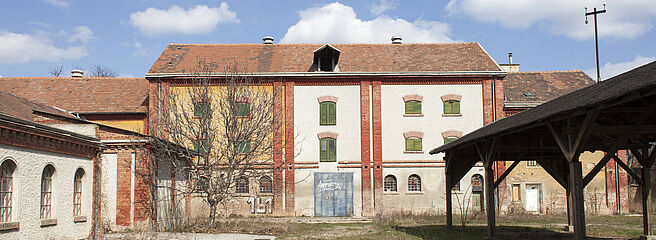
Wednesday, 13. Oktober 2021, 5 pm
Zukunftshof, Rosiwalgasse 41-43, 1100 Wien
ROTH:NEU:SIEDL folgt dem Wasser
Opening and panel discussion with ...
Brigitte Felderer (curator and cultural theorist)
Zdravko Haderlap (artist in residence at Kunsthalle Exnergasse)
Thomas Romm (civil engineer and architect)
Moderation: Klaus Schafler (Kunsthalle Exnergasse)
Built around 1900 in Rothneusiedl on Vienna’s southern periphery, the former agricultural estate and Pick-Your-Own farm Haschahof – now “Zukunftshof” – is on its way to becoming a visionary centre for urban agriculture and socio-ecological district development. The historical brick building is intended to serve as a production facility in the spirit of circular economy, as a site for social projects and education programmes, and as a neighbourhood centre. Kunsthalle Exnergasse participates in this development with a temporary outpost on the premises, an artist-in-residence programme that initiates and implements artistic interventions motivated by the central topics of the Zukunftshof.
On the terrace of the “Gugumuck” garden bar, with a view to the sign “ROTH:NEU:SIEDL folgt dem Wasser” (ROTH:NEU:SIEDL follows the water) mounted on the western face of the complex, experts from different disciplines discussed the material and immaterial resources of the Zukunftshof and the surrounding fields in Rothneusiedl.
Technical realisation and sign mounting: Kosmos Events Art GmbH
An event in the framework of the Kunsthalle Exnergasse Artist-in-Residence Programme in cooperation with the Social Design Studio (University of Applied Arts Vienna).
Biographies
Brigitte Felderer is a curator and cultural theorist based in Vienna. The professor at the University of Applied Arts Vienna currently heads the master programme “Social Design – Arts as Urban Innovation” and has realised numerous exhibitions and publications in the field of media and cultural history. In her projects and teaching practice Brigitte Felderer investigates topics that transcend disciplinary and thematic borders, with a special focus on everyday culture, while pursuing the multifarious entanglements between the sciences and artistic movements, popular and high culture.
Zdravko Haderlap, lives and works since 2001 at his parents’ mountain farm in Lepena by Bad Eisenkappel, Carinthia. He is active as a beekeeper, distiller, author and theatre maker, cultural worker, journalist, photographer, (co-)editor, (co-)initiator and curator of regional culture and art venues, artistic advisor, and communicator. Artist-in-residence of Kunsthalle Exnergasse in 2020/2021, invitation in cooperation with the Social Design Studio, University of Applied Arts Vienna.
Thomas Matthias Romm, is a civil engineer and architect with a focus on the environmental effectiveness of planning and building. As a pioneer and expert in circular economy, his architectural office “forschen planen bauen” has been working since 2010, in a bidding consortium with Dr. Roland Mischek ZT, on the handling of large construction sites, primarily in Viennese residential construction. He is the founder of BauKarussell, a cooperation network of socio-economic enterprises for the re-use of building components, and teaches ecology for architects at the Academy of Fine Arts Vienna at the Institute for Art and Architecture (IKA).
Zdravko Haderlap: “The future city seen through the eyes of a mountain farmer”
After some hesitation and pondering my perspective as a mountain farmer, I accepted the invitation by Kunsthalle Exnergasse and the University of Applied Arts Vienna / Department of Social Design to participate as an artist-in-residence at the temporary Zukunftshof/Haschahof outpost – a research residency in the spirit of an “innovative artistic practice”. Located in the south of Vienna, the “Vierkanthof” square courtyard farmhouse was built around 120 years ago and had stood vacant for several years. The red brick buildings occupy a spacious plot surrounded by more than 120 hectares of fertile farmland, which is now zoned to become an urban residential area for about 20,000 inhabitants.
Given my professional background, the guiding principle was to attain a deeper understanding of the relationship between human beings and their environment. A key issue since time immemorial, it has become an existential one along with the increased devastation of our ecosystems. Hence, I followed the traces of water as THE basis of all life. Perceiving and acknowledging this fundamental connection is crucial for understanding our involvement in and dependency on this element. Water fed my stream of thoughts and led me to questions, which need to be answered before future urban structures can even be conceived in a responsible manner.
It is in the hands of the people of ROTH:NEU:SIEDL, with their exceptional resources and competences, to stop the economic march of time in order to think about the future. Whoever wants to learn about their motivations must follow the traces of water. There is an inextricable, fateful correlation between a prosperous habitat – be it rural or urban – and the precious resource water.


